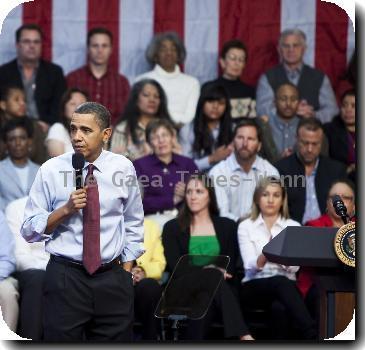Pakistan: US al-Qaida suspect is not spokesman for terrorist network, as previously believed
By Sebastian Abbot, APMonday, March 8, 2010
American al-Qaida suspect is not group’s spokesman
ISLAMABAD — Pakistani officials reversed course Monday on a recently captured American suspected of being a member of al-Qaida, saying the man is not the terror network’s U.S.-born spokesman, as they initially believed.
The man arrested in the southern city of Karachi was first identified as al-Qaida spokesman Adam Gadahn, the most wanted American in the terrorist network. But authorities later said it was a case of mistaken identity and that they have a different American in custody.
Pakistani intelligence officials instead identified him as Abu Yahya Majadin Adam, a name similar to one listed on the FBI’s Web site as an alias for Gadahn, the 31-year-old man who has appeared in several al-Qaida videos threatening the West since 2001.
“The resemblance of the name initially caused confusion, but now they have concluded he is not Gadahn,” said an intelligence officer, who, like all Pakistani intelligence agents, spoke on condition of anonymity because he was not authorized to talk to the media.
“He feels proud to be a member of al-Qaida,” the officer added.
Word of the man’s identity came on the same day that a suicide car bomber struck a police interrogation building in the eastern city of Lahore, killing 13 people. The attack broke what had been a relative lull in violence in Pakistan, where militant groups revile the government for its alliance with the U.S.
A senior U.S military intelligence official confirmed Monday that the man arrested does not appear to be Gadahn. The official spoke on condition of anonymity because of the sensitivity of Pakistani operations.
White House spokesman Bill Burton said President Barack Obama is getting updates on reports of the detained American but that the White House has not confirmed the information.
Asked about the arrests, Pakistani Interior Minister Rehman Malik cited unspecified reports that “some foreigners have been arrested two days back.” He said he had asked for more information on their identities from the intelligence agencies, which operate largely outside the control of the civilian government.
U.S. Embassy spokesman Rick Snelsire said the embassy had not been informed of any Americans being arrested, raising further questions about the man in custody.
The last known American al-Qaida member to be arrested in Pakistan was Bryant Neal Vinas, who was captured by Pakistani authorities in late 2008 in the northwestern city of Peshawar near the Afghan border.
Several other Americans are known to have gone to Pakistan to join militants, including the imprisoned “American Taliban,” John Walker Lindh, and Jose Padilla, who was convicted of sending money, recruits and supplies to Islamic extremist groups.
Pakistani police arrested five young American Muslims in December in the city of Sarghoda who they allege were trying to link up with militants. The men could face charges of waging war against Pakistan and planning terrorist attacks in the country.
Kamran Bokhari, an analyst with STRATFOR, a private security think-tank in Austin, Texas, said the risk from Americans recruited by al-Qaida was clear.
“If al-Qaida is able to pose a serious, credible threat to the United States, it is not going to happen with people who don’t have access to the States or who are not Americans,” Bokhari said.
Pakistan is under intense pressure from the U.S. to arrest al-Qaida and Taliban leaders living on its soil.
Last month, the country arrested the No. 2 commander of the Afghan Taliban, Mullah Abdul Ghani Baradar, in Karachi. Officials have also claimed to have detained other leaders in the movement.
Details of the arrests have been murky, coming primarily through Pakistani and Afghan officials speaking anonymously. None of the suspects have been presented before a court or charged.
Baradar’s detention and the other reported arrests have been seen as a sign that Pakistan, which has been criticized in the past as an untrustworthy ally in the fight against al-Qaida and the Taliban, was cooperating more fully with Washington.
Associated Press writers Munir Ahmad and Chris Brummitt in Islamabad and Anne Gearan in Kabul contributed to this report.
Tags: Arrests, Asia, Barack Obama, Embassies, Islamabad, Karachi, North America, Pakistan, South Asia, Terrorism, United States


